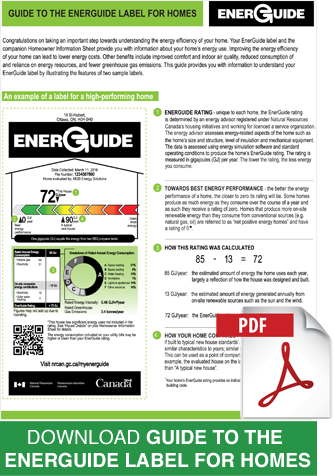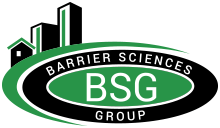A Homeowner’s Guide to EnerGuide Ratings
Understanding your home’s energy consumption patterns
 Whatever the size of your home, energy is being consumed every day, around the year. And while the utility bills might show you a monthly total, there are important questions about how energy is actually being used. Getting answers to these questions will help to conserve energy and save on seasonal energy costs. This is where an EnerGuide Rating can be valuable – it’s the first step in getting answers to home energy consumption patterns. The rating will tell a homeowner exactly how energy efficient the home is. Better still, the EnerGuide Rating will clearly identify the areas of the home where a renovation, upgrade, or retrofit will increase efficiency and use less energy.
Whatever the size of your home, energy is being consumed every day, around the year. And while the utility bills might show you a monthly total, there are important questions about how energy is actually being used. Getting answers to these questions will help to conserve energy and save on seasonal energy costs. This is where an EnerGuide Rating can be valuable – it’s the first step in getting answers to home energy consumption patterns. The rating will tell a homeowner exactly how energy efficient the home is. Better still, the EnerGuide Rating will clearly identify the areas of the home where a renovation, upgrade, or retrofit will increase efficiency and use less energy.
How to interpret the results of a home’s EnerGuide Rating
Homeowners should be aware that EnerGuide Ratings are issued by Certified Energy Auditors, under the umbrella of Natural Resources Canada. It’s a mistake to contract a “door-to-door” seller who may claim EnerGuide or Energy Star authorization. Professionally expedited, an EnerGuide Rating ranges from 0 through 100, with a high rating indicating more optimum energy efficiency. Typically, a new home that’s built to the established building codes will have a rating of 65+. The home that has had energy efficiency upgrades could reach 73, or even higher. Understandably, an old home will rate below 65 – clearly in need of retrofits to boost efficiencies (and the rating).
The newest version of the EnerGuide Rating System is here
With a new vision for energy conservation, and new emphasis on home energy efficiency, there’s an improved EnerGuide Rating System (Version 15) offering more opportunities and options for homeowner improvements. In fact, it’s now possible to compare one home with another, and therefore assess comparative energy patterns. Probably the most important new feature is a new rating system. Replacing the 0-100 measurement, the new rating estimates how much energy is consumed in a year. The lower the rating, the more energy efficient the home is. The new system will allow a homeowner to calculate exactly how much is being spent on energy bills annually.
The main aim of the EnerGuide Rating System is to give homeowners a “game plan” for achieving energy efficiency in the home, using less energy, and saving dollars. Homeowners can therefore identify where energy is being used, and where energy is being wasted. This will set the stage for energy upgrades that will solve problem areas, and deliver savings. Today, an EnerGuide Rating belongs to the homeowner – but in 2019, every home will require an EnerGuide Rating before it is listed for sale. Needless to say, a better rating will add value to a home. Moreover, this shift to transparent ratings will create higher standards for both real estate people and homebuilders.
For the homeowner, the next step is an energy action plan
From air leakage, to poorly performing HVAC equipment, to badly installed insulation, there are a number of upgrades and retrofits that a homeowner can undertake – all of which will improve energy efficiency. At Barrier Sciences Group, home energy experts take the process from start to finish. The BSG team begins with an initial Home Energy Audit, identifies deficiencies throughout the home, and provides the necessary remediation – from renovation to retrofitting.
What is a good EnerGuide rating for a house?
Developed by Natural Resources Canada, the EnerGuide Rating System measures your home's energy efficiency and performance. Energy efficiency levels are rated on a measured scale between 0 and 100. A rating that measures 0 represents a home with major home energy problems - serious air leakage; poorly performing insulation; and overly high consumption of energy. On the flip side, a rating of 100 represents a home that is airtight, properly insulated, and with great energy efficiency. By example, an old home, without any energy upgrades, might have an EnerGuide Rating of about 50. At the same time, a home that is highly energy efficient (a new home) could rate between 80 and 90.
What does an EnerGuide label for appliances tell you?
Targeted at consumers, the EnerGuide label will help you to make energy-wise shopping decisions. The label does not immediately indicate that an appliance is particularly energy efficient unless you know what to look for. What it does show is how much energy that appliance consumes, and it allows you to compare appliances one on one.
Amongst the “metrics” printed on the EnerGuide label, the energy usage of an appliance is designated, and measured in kilowatt-hours. Here, the lower the number, the better the rating. The EnerGuide label also indicates how one appliance model compares with another product, helping you to select.
What is an EnerGuide number?
As an official Government of Canada trademark, the EnerGuide number rates the energy consumption and energy efficiency of specific consumer products. EnerGuide rating labels cover a range of products - from household appliances, to heating/cooling equipment (HVAC), to homes and vehicles.
To attain an EnerGuide number for your home, a formal Energy Evaluation is required, including tests that assess air leakage, insulation performance, and overall energy efficiency. Bottom line, an energy efficient home saves energy, reduces greenhouse gas emissions, and reduces carbon footprints.
What’s the difference between ENERGY STAR and EnerGuide?
The official ENERGY STAR logo classifies appliances that meet or exceed specifically high levels of energy efficiency. Naturally, these models are considered the best options for consumers who are shopping for home appliances. The ENERGY STAR designation helps to decide when purchasing.
EnerGuide is the rating system used to highlight the energy efficiency/consumption of an appliance or device. The EnerGuide rating (and label) helps you to find products with better energy performance. As such, you save on energy costs throughout the year, and engage in a “greener” environment.
What is a Certified NRCan Energy Advisor?
Certified Energy Advisors are accredited by National Resources Canada (NRCan) to conduct formal EnerGuide Home Evaluations. Energy Advisors provide a third party assessment for homeowners who are interested in upgrading their home’s energy efficiency, while reducing annual energy consumption.
Throughout most of Ontario, Barrier Sciences Group provides a team of Certified Energy Advisors who work alongside homeowners to improve and upgrade energy efficiency. Our Advisors identify problem areas and offer solutions – everything from enhancing insulation R-Values to upgrading ventilation systems.
Is there an EnerGuide Rating rebate?
There are no EnerGuide Rebates when you purchase an energy efficient appliance. However, if you make energy-wise improvements to your home, a number of rebate programs are readily available.
Rebates from Enbridge Gas
The Home Reno Rebate from Union Gas includes upgrades to home insulation, air sealing, and even window upgrades. With rebates up to $5,000, you must work alongside a Certified Energy Advisor.
Incentives from the City of Toronto
The Home Energy Loan Program provides Toronto homeowners with low-interest loans to make home energy upgrades and retrofits. HELP allows the homeowner to fully pay back the loan over time.
What can Barrier Sciences Group do for me?
If you’re a homeowner interested in improving your home’s energy efficiency, Barrier Sciences Group can manage everything from start to finish. To start, the home energy experts at BSG will provide an in-depth Home Energy Audit – this will identify the deficiencies throughout the home. Following this audit, recommendations are made for energy retrofits and improvements.
The objective of a home energy evaluation (Home Energy Audit) is to establish a “before-and-after” scenario for an EnerGuide Rating. This allows a homeowner to make energy efficiency improvements that will measurably upgrade their EnerGuide Rating. At BSG, our in house experts provide an in-depth energy evaluation that accurately reflects the overall home performance.
- airtightness is tested throughout the entire home
- air ventilation and air circulation and are measured
- insulation is assessed in the basement, attic, and walls
- general home energy efficiency and performance is gauged
- heating and air conditioning (HVAC) is inspected for efficiency



